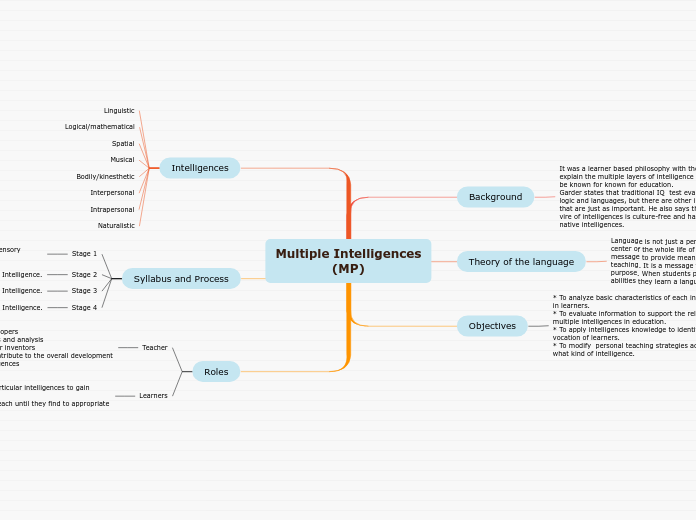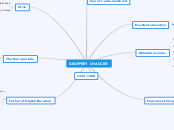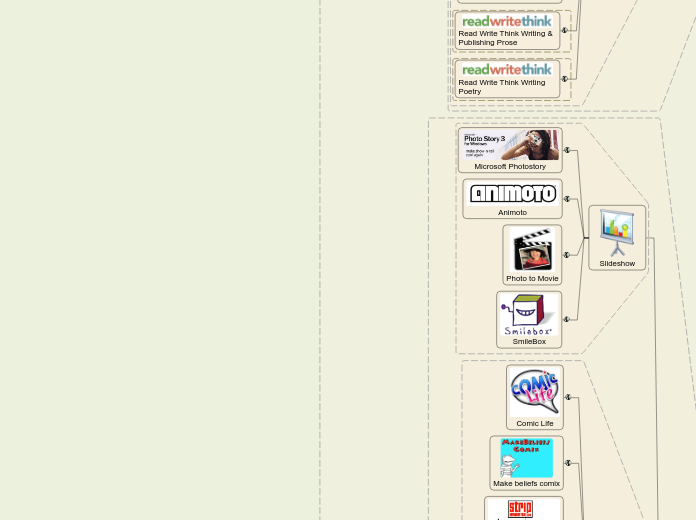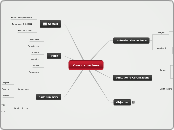Multiple Intelligences
(MP)
To name your story, you have to think about the overall message and what you want your audience to understand from the story. Also, make it relevant and easy to remember.
Roles
Learners
* Active learners.
* They use their particular intelligences to gain knowledge
* Experiment with each until they find to appropriate ones for them.
Teacher
* Curriculum developers
* Lesson designers and analysis
* Activity finders or inventors
* They have to contribute to the overall development of students’ intelligences
Syllabus and Process
Stage 4
Transfer of the Intelligence.
Stage 3
Teach with/for the Intelligence.
Stage 2
Amplify the Intelligence.
Stage 1
Awaken the intelligence. Through multisensory experiences.
Intelligences
The ending of a story is essential. We all know that if the ending is weak, what happened before loses its importance. So make it unpredictable, but fair. A resolved ending answers all the questions and ties up any loose threads from the plot.
Naturalistic
Intrapersonal
Interpersonal
Bodily/kinesthetic
Musical
Spatial
Logical/mathematical
This is the closure section of the story.
See examples of possible outcomes below:
- all problems have been solved
- it's clear how each one of your characters ends up
- your main character is transformed by the challenge
Linguistic
This is the moment when the main character surpasses the last obstacle and finally faces their greatest challenge.
The climax usually follows one of these patterns:
- realization
- resolution
- choice
Type in your answer.
Objectives
* To analyze basic characteristics of each intelligence in learners.
* To evaluate information to support the relevance of multiple intelligences in education.
* To apply intelligences knowledge to identify vocation of learners.
* To modify personal teaching strategies according what kind of intelligence.
Theory of the language
The middle of the story is where you add layers of complications that will lead to the end. Reveal more about the character's journey. Did their personality go through changes? How did they overcome the challenges? And as you build up the story’s central conflict, make it more personal to that character. Also, from the middle act, you have to lead into the final act.
Language is not just a peripheral skill but also as center of the whole life of the language. It is a message to provide meaning an purpose to the teaching. It is a message to provide meaning and purpose. When students put their own effort and abilities they learn a language quickly.
Each story has a main character and that character usually needs to solve a problem or challenge. The character's challenge is the one that creates tension throughout the story.
Background
In the beginning of the story (or the exposition), you will need to introduce the setting and characters. You might also want to introduce the main conflict. This part of the story is important because it gives the reader necessary background information and maybe even a first insight into a character’s personality.
It was a learner based philosophy with the goal to explain the multiple layers of intelligence that has to be known for known for education.
Garder states that traditional IQ test evaluates only logic and languages, but there are other intelligences that are just as important. He also says that in his vire of intelligences is culture-free and has eight native intelligences.
Characters are essential to a good story. Usually, the protagonist(s) is/are the most affected by the plot. Introduce a character by focusing on their actions, interests, and occupation, as the physical appearance doesn't make a difference in most cases.










